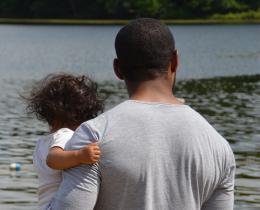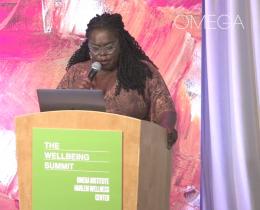Marianne: When you hear the term power, what does it bring up in you? How do you define it?
Ai-jen: We talk a lot about the importance of organizing, especially among women, because we believe that we need to build power to change the world and win for women everywhere—particularly low-income women. When I hear the term power, what it brings up is what it takes to win meaningful change in people's lives at scale, and that's the kind of power that we're interested in building.
Marianne: As you know, part of Omega's work is to envision creating a new paradigm of power. What would a new paradigm of power look like to you?
Ai-jen: I envision a world where there's a fundamental sense of equity and connection between people, and the value of human relationships and humanity is elevated. I think about a world where all work, including work that has historically been associated with women and devalued—like the work that goes into caring for families across generations—is truly recognized, accounted for, valued, and protected. I think about a world where people bring the best of who they are to the table, at all times, and really try to nurture that in each other. A world where people are really invested in strengthening connections and relationships between different experiences and generations.
I'm in the midst of building a campaign called Caring Across Generations, and we spend a lot of time thinking about values and our vision for the kind of world we're trying to build. We talk about equality, equity, democracy, and opportunity, but also the human dimension where people have the ability to realize their full potential and their power, and the potential of relationships to transform us and be transformed by us.
Marianne: You were featured this year as one of Time magazine’s 100 Most Influential People in the World. In your video for the magazine, you talk about the enormous effect your mother and grandmother had on you and that your mother had always valued all types of work, including the work it takes to raise a family. Can you talk about how the unfinished business of the women’s movement is to bring respect and dignity to this type of work?
Ai-jen: Twenty years ago, Gloria Steinem wrote an article called “Revaluing Economics,” and talks about the two invisible resources upon which everything in our economy and in society is built. One is the work that historically women have done to take care of families across generations, and the other is the planet's natural resources. She talks about how any vision for a sustainable and thriving economy of the future has to fundamentally revalue and put these two resources at the core of building a new economy.
Women have had more opportunities to go into different fields of work, but caring for families—that first piece of work, in the home—was never given its due value and recognition. That leaves us in the same cycle working class and poor women have always been in—women are doing two and three times the amount of work that is humanly possible.
There's still a tremendous amount that we have to do to bring recognition to that work, to figure out how we account for it, how we value it, and how we protect it. It begins with domestic workers still being excluded from some of the most basic labor laws, which is an indication of the kind of shifts that need to happen for us to have a truly sustainable economy in an environment that works for women. If you were to bring value and respect to that work, it would be a much more equitable distribution of work all around and a much better work/family balance for everyone, not just for women.
Today women are more than half of the work force, do a vast majority of the care-giving work, represent more than half of the electorate, and live longer. Women are a driving force in society and the economy, so it’s essential that we finish that unfinished business.
Marianne: You've been successful in organizing and creating communities with women. What have you learned about the special ways women organize and create change?
Ai-jen: I can only speak about the women that I work with because there are lots of different types of organizing cultures and traditions that women draw from. In our alliance, we emphasize connection between the kinds of change we want to see in our own lives and for ourselves, and the kinds of changes that we want to see in the world and in the systems and institutions around us.
We really try to support our membership to bring the best of who they are to everything they do and to see healing, transformation, and self-empowerment as key pieces in a broader social change process. It’s not just about winning the domestic workers bill of rights, but how I develop as a leader and take on my own healing and development, which is fundamental to the change that I want to see in the world. How I strengthen relationships with my family, my community, and my sisters builds relationships through my organization. How do I pay attention to the individual and the relational, as a part of the institutional and social change we're trying to achieve?
Marianne: What do you see as the intersection between inner and outer change?
Ai-jen: I know for myself that change is constant. The one thing that you can always count on is change. As people who are interested in changing the world, we have to shape what change looks like. We learn the most about what makes change happen and what makes social change possible when we look deeply within ourselves. There's so much pain and suffering in the world. If we're not careful, we can start to replicate some of the pain and suffering in the world inside of ourselves.
It’s important that we have ways to stay grounded and connected to our sense of purpose as individual people and create a space where we can be reflective and intentional about how we want to change ourselves and transform the world. We need to make sure we're not just responding and reacting, but that we're grounded and rooted in our values and our sense of purpose. That takes a lot of practice. Just like passing legislation or organizing trainings or social actions takes practice, discipline, and focus, the same is true for the inner work that has to happen to make sure that we're really bringing the best of who we are to the table and we're growing as human beings as we try to win the change in the world for humanity.
Marianne: There are societal reasons that hold women back from assuming leadership positions, but often it's women themselves who are unwittingly holding themselves back, often because of societal influences or messages that they have internalized. What do you think are the factors that most often get in the way of women expressing their true power? How do you stay centered and strong?
Ai-jen: We’re given a lot of messages about our own worth from a lot of different places that aren't aligned with what's real. Creating community and safe spaces with other women where we can share our stories and people can recognize that they're not alone, is absolutely essential. One of the most important things our organizations do is bring women together to share stories. When you realize that you might not be the only one who goes through these things, it builds and strengthens a sense of humanity and a sense of, ‘It isn't just me. There's a larger thing happening and I actually have some agency and ability to do something about it and I have these people who will stand with me as I try.’
You can cultivate courage on your own, but a lot of courage happens through connection and relationship with others. For me, it's been incredibly inspiring to bear witness to women who, against all odds, assert the dignity of their work and their right to be recognized for the work that they do for families. That takes so much courage, and is a huge source of inspiration and strength. At the end of the day, all of us, we need other people to inspire us and give us strength.
Marianne: You have been very effective in representing and giving voice to a community that has very little political power. Do you think one purpose of power is to give people power who don’t have it? I think I heard you once say, “to make the invisible, visible?”
Ai-jen: I have a real stake in the world being in a different place for domestic workers, because if it is a different place for domestic workers, where there's real opportunity and recognition, it fundamentally changes the world for myself and my children. Even though there are ways in which I have more privilege and opportunity, I think that everyone has a real stake and a responsibility to try to move change forward, to make visible the invisible, and build power in places where there isn't any.
Workers who are part of our movement are already on the front lines of this work and are inspiring and empowering other domestic workers. You see me in the media, but I think I'm the least compelling spokesperson and representative of our movement. Women like my staff member Barbara Young, who we call “the mayor” because she's such an incredible public speaker, or Germina Costianos, a housekeeper in San Francisco who has organized hundreds of housekeepers into her women's collective—these are women who empower me and we build power together.
Marianne: I saw a quote of yours, “I don't want to live in a society that doesn't value people's humanity.” It really struck me, because I try to understand how we can still be at a place where, rather than realizing we are one human family, it is possible for people to look at someone else and somehow feel superior. The underlying problem of human society seems to be that we still do that.
Ai-jen: We are at a real crossroads. We have a lot of work to do. I talk a lot about this question of the soul of the country, because we are, on the one hand, a country that values liberty and justice for all, and on the other hand, we are constantly being pitted against one another, and our interests are constantly being framed as in opposition. In that context, groups of people keep getting dehumanized and work gets devalued and people are either locked out of opportunity, or trapped in exploitation.
What is really the soul of our country? Are we a country that is fundamentally about human dignity, respect, opportunity, and democracy, or are we not? How do we continue to challenge ourselves to strive toward humanity and dignity, even as we change? Change is constant, the nation is changing. We're changing demographically. Communities of color are growing, and we're aging. This is the second year of the age wave where the baby boomer generation starts turning 65 and people are living longer, so we're going to have a really large older adult population on our hands. In the midst of these changes, what's important is our core values and beliefs. I think humanity and dignity have to be at the core, and we really need to ground our values as we navigate through this period of uncertainty and change.
Marianne: The theme of the Women & Power conference in 2012, and the theme of this interview series, is “What’s Possible.” What do you think is possible when women become more empowered and present in leadership positions in the world?
Ai-jen: Women's leadership is going to be key to getting us to a sustainable and thriving economy and society. A gender lens is going to be necessary to fully understand what's happening in the economy and in society in order for us to put the policies and agenda pieces in place to strengthen democracy as we know it.
When I think about how much work is being done by women, how much care giving is done by women, and how we’re a majority of the electorate, it feels like we won't fully understand the problems and challenges we’re facing as a nation if we don't look at it through the eyes of women. When we do look at the world through the eyes of women, we not only understand the problems more clearly, but we also see solutions and opportunities that we might not otherwise see. Caring Across Generations, our campaign, is one example of what happens when you actually look at the world through the eyes of women. You find opportunities for transformation that really lift everyone. We talk to women who are caregivers and home-care workers, and women who need care, and develop a vision to create jobs, more affordable care, and better opportunities for care workers. It's an absolutely beautiful vision where everyone wins.
I think that the leadership of women, and applying a gender lens to our problems, can help to unlock more of these kinds of integrated, win-win solutions for the future. That’s why I'm a big proponent of women's leadership and of a strong women's movement, because I think there's a lot of opportunity for big solutions at this moment if we listen to what women are saying and experiencing.
Marianne: You were talking before about taking care of our inner self. How do you stay centered and practice self-care to keep yourself charged up for the work that you do?
Ai-jen: I practice yoga and spend time with my family. I enjoy the outdoors and hiking in the mountains. I enjoy imagining, just strategizing and talking about politics and the future with friends in an informal environment. All those things inspire me, feed me, and allow me to stay grounded and energized.
Marianne: Do you have a belief system or a life philosophy that helps to guide you?
Ai-jen: I really believe in the power of love. Different faith traditions talk about it differently, and I don't subscribe to one in particular, but I do believe that love is the most powerful force for change in the world, and it's really important for us to cultivate, because it helps us imagine the unimaginable and have the courage to do what we need to do.



